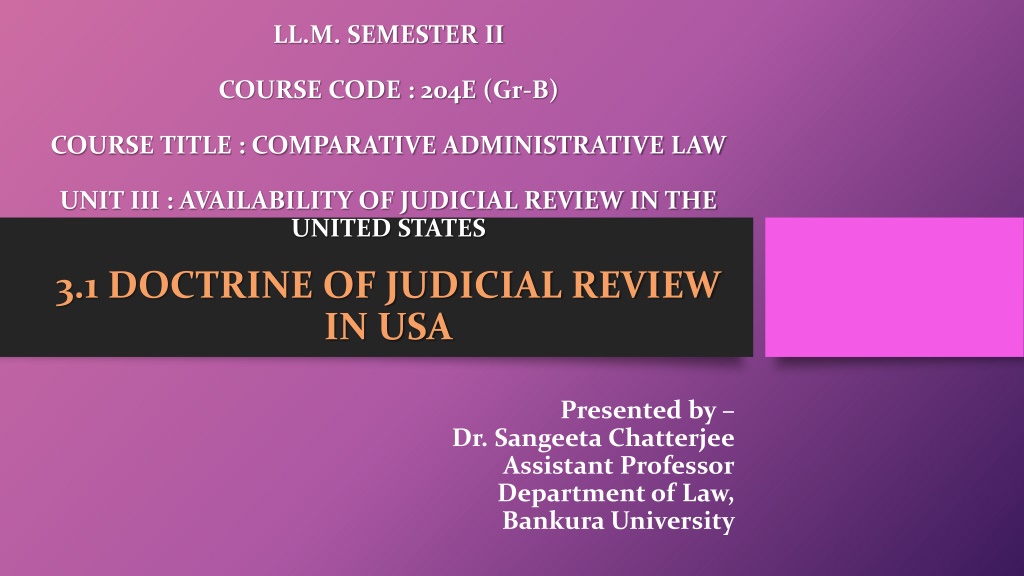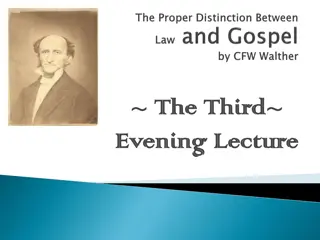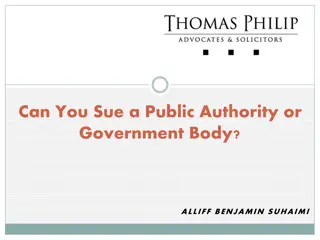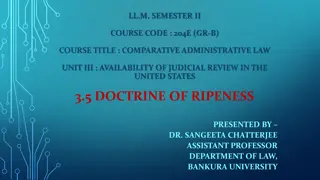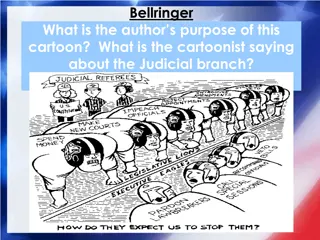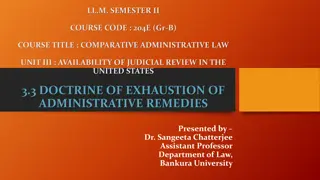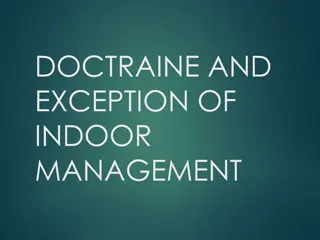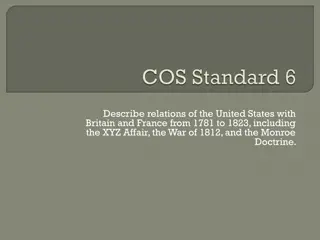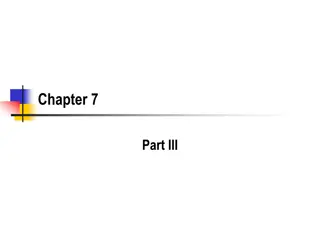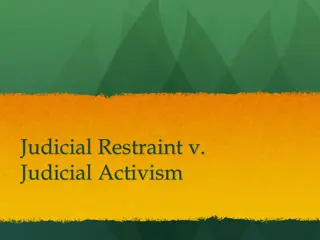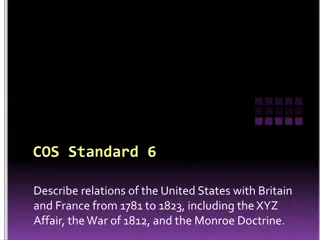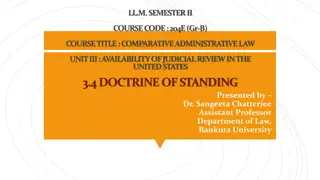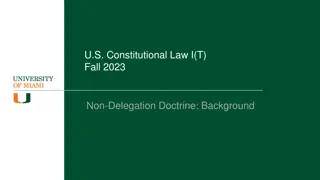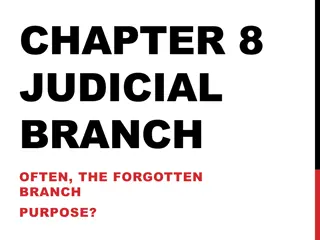Understanding the Doctrine of Judicial Review in the United States
Judicial Review is a crucial power of the judiciary to review the constitutionality of laws and executive orders. This article explores the origin of Judicial Review in the United States, focusing on the landmark case of Marbury v. Madison. It delves into the concept, importance, and application of Judicial Review in upholding the Constitution as the supreme law of the land.
Download Presentation

Please find below an Image/Link to download the presentation.
The content on the website is provided AS IS for your information and personal use only. It may not be sold, licensed, or shared on other websites without obtaining consent from the author. Download presentation by click this link. If you encounter any issues during the download, it is possible that the publisher has removed the file from their server.
E N D
Presentation Transcript
LL.M. SEMESTER II COURSE CODE : 204E (Gr-B) COURSE TITLE : COMPARATIVE ADMINISTRATIVE LAW UNIT III : AVAILABILITY OF JUDICIAL REVIEW IN THE UNITED STATES 3.1 DOCTRINE OF JUDICIAL REVIEW IN USA Presented by Dr. Sangeeta Chatterjee Assistant Professor Department of Law, Bankura University
INTRODUCTION One of the most important features of the judiciary is the power of Judicial Review. It is the power of the Supreme Court and the High Courts to examine the constitutionality of the Acts of the Parliament and the State Legislatures. It is also the power of the courts to examine the constitutionality of the executiveorders both of the centre and the state governments. If any such order or Act is found inconsistent with the Constitution, it can be declared as unconstitutional or ultra-vires to the Constitution. A law declared as unconstitutional by the Supreme Court cannot be enforced by the Government.
WHAT IS JUDICIAL REVIEW Judicial Review is the power of a court to enquire whether a law, executive order or other official action conflicts with written Constitution and, if the court concludes that it does, declare it unconstitutional and void. A Constitution is the fundamental law of the land. If there is any conflict between the Constitution and any law of the land, the court should recognise Constitution as the supreme law and always uphold it. This is the basis of Judicial Review.
ORIGIN OF JUDICIAL REVIEW The doctrine of Judicial Review was originated in USA. Originally the US Constitution did not contain any express provision of Judicial Review. Its origin was the result of a judicial decision. The concept of Judicial Review was developed by Chief Justice Marshall of the American Supreme Court in the famous case Marburyv. Madison in 1803.
THE CASE : MARBURY V. MADISON The Federalists had lost the election of 1800, but before leaving the office they had succeeded in creating new several new judicial posts. Among these were 42 justices of peace, to which the retiring Federalists President John Adams appointed 42 Federalists. The appointment of commissions were confirmed by the Senate and they were signed and sealed, but Adam s Secretary of State, John Marshall, failed todelivercertain of them.
THE CASE : MARBURY V. MADISON When the new President, Thomas Jefferson, assumed office, he instructed his Secretary of State, James Madison, not to deliver 17 of these commissions including one for William Marbury. Marbury filed a petition in the Supreme Court for the issue of a writ of Mandamus to Secretary Madison ordering him to deliver thecommissions. He relied on Section 13 of the Judiciary Act of 1789.
THE CASE : MARBURY V. MADISON The said Section 13 provided : The Supreme Court shall have the power to issue writs of Mandamus, in cases warranted by the principles and usages of law, to persons holding office, under the authority of the United States.
THE CASE : MARBURY V. MADISON The Court, speaking through Marshall, who had now become Chief Justice, held that Section 13 of the Judiciary Act was repugnant to Article III, Section 2 of the Constitution in as much as the Constitution itself limited the Supreme Court s original jurisdiction to cases affecting ambassadors, other public ministers and consuls, and those to which a State is party. Since Marbury fell in none of these categories the court had no jurisdiction in his case.
OBSERVATIONS OF CHIEF JUSTICE MARSHALL The Constitution is either superior paramount law unchangeable by ordinary means or it is on a level with legislative Acts, and like other Acts is alterable when the legislature shall please to alter it. Certainly, all those who framed written constitutions contemplate them as forming the fundamental and paramount consequently the theory of every such Government must be that an Act of the legislature repugnant to the Constitution is void. It is emphatically the province and duty of the Judicial department to say what the law is law of the nation and,
OBJECTIVES To uphold the principle of the supremacy of the Constitution. To maintain federal equilibrium i.e. balance between the centre and the states. To protect the fundamental rights of the citizens.
TYPES OF DECISIONS THE SUPREME COURT CAN GIVE AFTER JUDICIAL REVIEW IS CONDUCTED That the law is unconstitutional. That the law is constitutional and fair. That any part or some parts of unconstitutional. the law are
LIMITATIONS OF THE DOCTRINE The Court does not conduct judicial review over political issues. While declaring a law unconstitutional the Court has to assign reasons and specify the provisions of the Constitution that it violates. The Supreme Court conducts judicial review only in cases actually brought before it. It cannot initiate the process of its own. The law declared invalid ceases to operate for the future. The work alreadydone on its basis continues to be valid. The Court has to demonstrate clearly the unconstitutionality of the law which is sought to be declared invalid.
CONCLUSION Despite various shortcomings of judicial review, it cannot be denied that it has played an important role in ensuring constitutional government in the country by keeping the centre and the states in the respective spheres. It has also enabled the Constitution to change according to changed conditions by imparting new meaning to the constitution. Through the exercise of this power, the Supreme Court has protected the freedom of citizens and protected their Fundamental Rights against encroachment by the legislative and executive wings of thegovernment.
REFERENCE : 1. Dr. J. N. Pandey, Constitutional Law of India, Central Law Agency, Allahabad, 40th Edition, 2003. Himani Dutta, Judicial Review in India and USA, www.legalservicesindia.com/article/1734/ Judicial-Review-in-India-And-USA.html, visited on 05.05.2020. 2.
